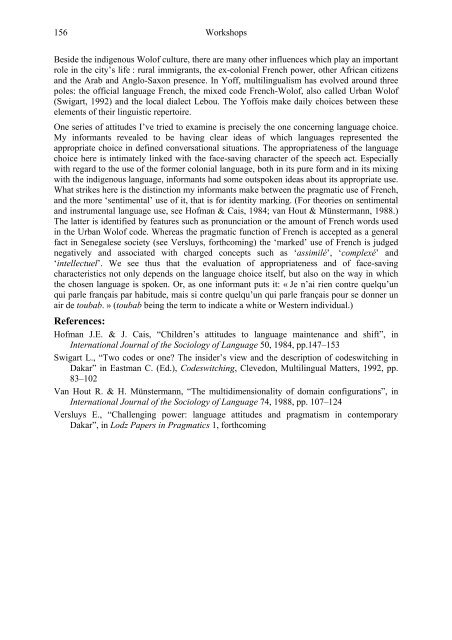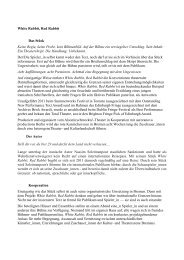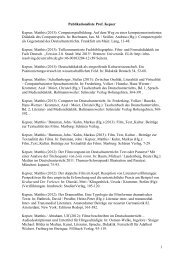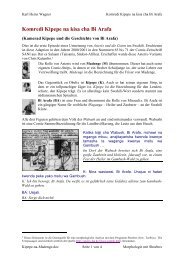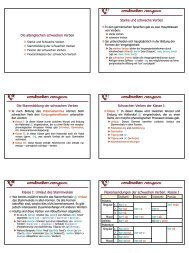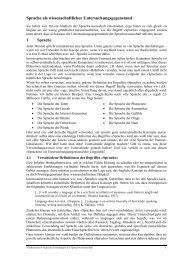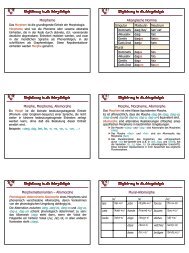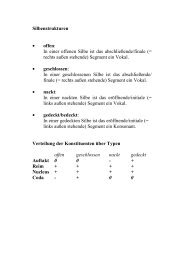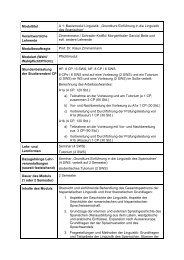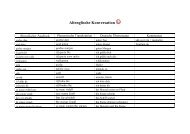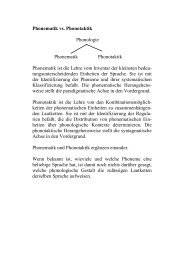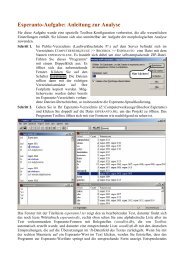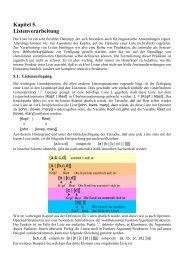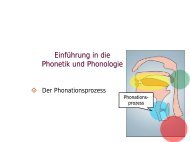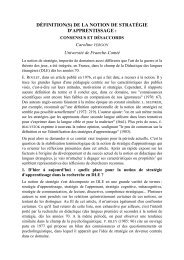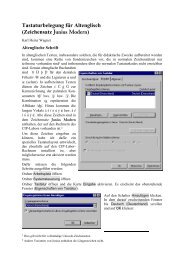Relativism and Universalism in Linguistics - Fachbereich 10 ...
Relativism and Universalism in Linguistics - Fachbereich 10 ...
Relativism and Universalism in Linguistics - Fachbereich 10 ...
Create successful ePaper yourself
Turn your PDF publications into a flip-book with our unique Google optimized e-Paper software.
156 Workshops<br />
Beside the <strong>in</strong>digenous Wolof culture, there are many other <strong>in</strong>fluences which play an important<br />
role <strong>in</strong> the city’s life : rural immigrants, the ex-colonial French power, other African citizens<br />
<strong>and</strong> the Arab <strong>and</strong> Anglo-Saxon presence. In Yoff, multil<strong>in</strong>gualism has evolved around three<br />
poles: the official language French, the mixed code French-Wolof, also called Urban Wolof<br />
(Swigart, 1992) <strong>and</strong> the local dialect Lebou. The Yoffois make daily choices between these<br />
elements of their l<strong>in</strong>guistic repertoire.<br />
One series of attitudes I’ve tried to exam<strong>in</strong>e is precisely the one concern<strong>in</strong>g language choice.<br />
My <strong>in</strong>formants revealed to be hav<strong>in</strong>g clear ideas of which languages represented the<br />
appropriate choice <strong>in</strong> def<strong>in</strong>ed conversational situations. The appropriateness of the language<br />
choice here is <strong>in</strong>timately l<strong>in</strong>ked with the face-sav<strong>in</strong>g character of the speech act. Especially<br />
with regard to the use of the former colonial language, both <strong>in</strong> its pure form <strong>and</strong> <strong>in</strong> its mix<strong>in</strong>g<br />
with the <strong>in</strong>digenous language, <strong>in</strong>formants had some outspoken ideas about its appropriate use.<br />
What strikes here is the dist<strong>in</strong>ction my <strong>in</strong>formants make between the pragmatic use of French,<br />
<strong>and</strong> the more ‘sentimental’ use of it, that is for identity mark<strong>in</strong>g. (For theories on sentimental<br />
<strong>and</strong> <strong>in</strong>strumental language use, see Hofman & Cais, 1984; van Hout & Münstermann, 1988.)<br />
The latter is identified by features such as pronunciation or the amount of French words used<br />
<strong>in</strong> the Urban Wolof code. Whereas the pragmatic function of French is accepted as a general<br />
fact <strong>in</strong> Senegalese society (see Versluys, forthcom<strong>in</strong>g) the ‘marked’ use of French is judged<br />
negatively <strong>and</strong> associated with charged concepts such as ‘assimilé’, ‘complexé’ <strong>and</strong><br />
‘<strong>in</strong>tellectuel’. We see thus that the evaluation of appropriateness <strong>and</strong> of face-sav<strong>in</strong>g<br />
characteristics not only depends on the language choice itself, but also on the way <strong>in</strong> which<br />
the chosen language is spoken. Or, as one <strong>in</strong>formant puts it: « Je n’ai rien contre quelqu’un<br />
qui parle français par habitude, mais si contre quelqu’un qui parle français pour se donner un<br />
air de toubab. » (toubab be<strong>in</strong>g the term to <strong>in</strong>dicate a white or Western <strong>in</strong>dividual.)<br />
References:<br />
Hofman J.E. & J. Cais, “Children’s attitudes to language ma<strong>in</strong>tenance <strong>and</strong> shift”, <strong>in</strong><br />
International Journal of the Sociology of Language 50, 1984, pp.147–153<br />
Swigart L., “Two codes or one? The <strong>in</strong>sider’s view <strong>and</strong> the description of codeswitch<strong>in</strong>g <strong>in</strong><br />
Dakar” <strong>in</strong> Eastman C. (Ed.), Codeswitch<strong>in</strong>g, Clevedon, Multil<strong>in</strong>gual Matters, 1992, pp.<br />
83–<strong>10</strong>2<br />
Van Hout R. & H. Münstermann, “The multidimensionality of doma<strong>in</strong> configurations”, <strong>in</strong><br />
International Journal of the Sociology of Language 74, 1988, pp. <strong>10</strong>7–124<br />
Versluys E., “Challeng<strong>in</strong>g power: language attitudes <strong>and</strong> pragmatism <strong>in</strong> contemporary<br />
Dakar”, <strong>in</strong> Lodz Papers <strong>in</strong> Pragmatics 1, forthcom<strong>in</strong>g


